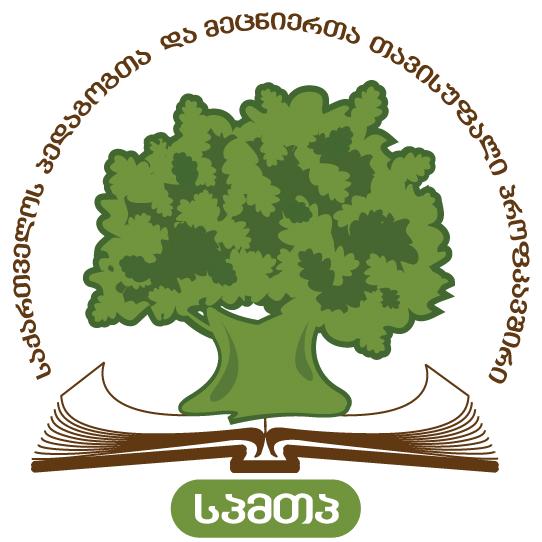On December 7-8, 2019, a two-day follow-up seminar on “Written/summative Assignments and Formative Assessment” was held at Tskneti Teachers' Training Base. Up to 40 teachers from 20 public schools of Georgia attended four-day training with Danish trainers in the framework of the project "Developing School and Education Policy Advocacy Opportunities in Georgia in Collaboration with the ESFTUG."This project has been implemented since 2017 by the Educators and Scientists Free Trade Union of Georgia (ESFTUG) in cooperation with The Danish National Union of Upper Secondary School Teachers (GL) and with the support of the Danish Ministry of Foreign Affairs.
The purpose of the two-day follow-up Seminar was to discuss the feedback on the use of contemporary teaching-learning methods in Danish trainings and to develop recommendations. During the past two months, Georgian teachers trained by Danish expert teachers have held meetings with their colleagues at their school and county level, with the support of ESFTUG. They provided information on modern teaching methods and tools, prospects for its introduction / development in the classroom for the development of student-centered teaching and school educational policy. Beneficiary teachers of the Danish project introduced their colleagues to topics such as the Flum’s Pentagonal and Hexagonal methods, various types of written / summative assignments, games as learning tools - puzzles, domino and more.
On the first day of the seminar, five teachers gave presentations:
Anna Anushidze, teacher of geography and social sciences and art teacher Mtvarisa Babilodze of Batumi Public School # 2; Gardabani Municipality Lemshveniera Public School teacher of Georgian language and literature Tsaro Kharziani and Gulnazi Chelidze, Principal of the same school;
Manana Chikovani, history teacher of Jalal Community Public School in Tsalenjikha Municipality; Madona Ulumbelashvili and Marine Vepkhvadze, teachers of N2 public school in Kharagauli; Nino Nonikashvili, Physics and Mathematics Teacher of Gori N7 Public School.
Discussions were held. The teachers shared with each other success stories concerning the project, their views and results, identified barriers and effective strategies for overcoming them.
The seminar was attended by Shalva Mekravishvili, expert of the Department of National Curriculum of the Ministry of Education, Science, Culture and Sport, who focused on current issues in the education system. Shalva Mekravishvili introduced the participants to the visions and approaches of the Ministry regarding written / summative assignments and Criterion-referenced / formative assessments. He also noted that changes are being made to the National Curriculum and welcomes, The involvement of ESFTUG in this process: “Our department will always be open to all interested parties, for workshops or meetings of any other format. We will work together to develop a national curriculum that is as accessible, achievable and optimal as possible. On the one hand, we urge you to embark on our institution with professional teacher initiatives, ideas and suggestions, as this area is common to all and it would not be an exaggeration to say that the development of the state depends on the education system. On the other hand, we look forward to a package of recommendations from the ESFTUG to broaden engagement and advocacy among teachers and unions. ”
A discussion was held between the guest and the participants of the seminar on a number of interesting topics related to the promotion and development of teaching-learning with the involvement of practicing teachers.
On the second day of the seminar, Giorgi Nozadze, an education expert, ESFTUG President's Advisor on Education, discussed the presentations by the direct beneficiary teachers of the Danish project, results and barriers. He emphasized effective ways of assessing students' competences. In particular, he advised that teachers collected relevant evidence and make conclusions based on the analysis for the purpose of checking the students’ competences. Mr. Gia introduced several models of student assessment to teachers: "Envelope Assessment", "Self-Assessment Instrument-Amoeba", "Written Assignment Feedback Model" and more. Giorgi Nozadze focused on specific recommendations, which should facilitate the interaction of teachers and students, including the development of the student readiness/development levels, the use of technical means, individual feedback practices, formative assessment, avoidance of personality-related remarks with students. While discussing written and summative assignments, the speaker advised teachers to describe the previous work rather than judge it, in order to encourage students to think and/or make them reflect.
Follow up seminar coordinator Ekaterine Chelidze together with colleagues developed future action plans for the preparation of a recommendation package related to the written/summative assignments.
In the final part of the seminar, Maia Kobakhidze, the President of ESFTUG, introduced the union’s visions regarding current processes in the system. The teachers discussed the “Draft Regulation of the Teaching Profession” and developed



